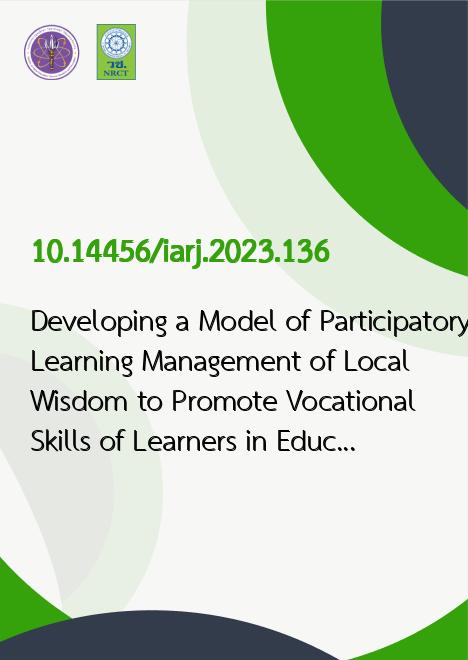
|
Developing a Model of Participatory Learning Management of Local Wisdom to Promote Vocational Skills of Learners in Educational Institutions under the Office of Maha Sarakham Primary Educational Service Area 1 |
|---|---|
| รหัสดีโอไอ | |
| Creator | Supaporn Lamahai |
| Title | Developing a Model of Participatory Learning Management of Local Wisdom to Promote Vocational Skills of Learners in Educational Institutions under the Office of Maha Sarakham Primary Educational Service Area 1 |
| Contributor | Tipaporn Sujaree, Pongtorn Popoonsak |
| Publisher | DR.KEN Institute of Academic Development and Promotion. |
| Publication Year | 2566 |
| Journal Title | Interdisciplinary Academic and Research Journal |
| Journal Vol. | 3 |
| Journal No. | 3 |
| Page no. | 381-400 |
| Keyword | Learning Management Mode, Participation in Local Wisdom, Vocational Skills of Learners |
| URL Website | https://so03.tci-thaijo.org/index.php/IARJ/about |
| Website title | https://so03.tci-thaijo.org/index.php/IARJ/article/view/264227 |
| ISSN | 2774-0374 |
| Abstract | Community participation in education management is of paramount importance for educational reform to achieve the goal of providing quality education. The participation of the community in the management of school education at present has not been able to achieve concrete results. Therefore, the emphasis on community participation in education management is to develop the learning process and determine educational management guidelines that are in line with the needs of the community. Thus, this research objective are 1) to study basic information and learning management conditions, 2) to develop learning management models, 3) to study the experimental results of learning management models, and 4) to confirm the effectiveness of participatory learning Management of local wisdom to Promote Vocational Skills of Learners in Educational Institutions under the Office of Maha Sarakham Primary Educational Service Area 1, research is divided into 4 stages. Including Phase 1 of the basic data study. Examples include 285 instructors using randomized class methods according to school size and the target group used for interviews. 6 executives and school instructors with best practices. The tools used include a questionnaire on students' learning management and vocational skills and interviews. It has a structure to analyze data by averaging the standard deviation. Phase 2 developed a model. The target group is experts in expert reference seminars. 9 people. The tools used were learning management models, consistency assessment, and suitability of the model. Analysis of the data by averaging the standard deviation. Phase 3 trials using the model. The sample used was 36 students in elementary school using group randomization. The tools used were (1) participatory learning management models. Local wisdom to promote vocational skills of learners in educational institutions (2) Learning Management Plan (3) Test (4) Teacher Opinion Questionnaire Using learning management model and (5) a questionnaire of students using local knowledge management model and Phase 4 confirmed the effectiveness of the model. The target group was school administrators, teachers, and local intelligence assessment of 9 local knowledge management models. The quality of the learning management model analyzed the data using the mean, and standard deviation. The research results appeared as follows; (1) Participatory learning management conditions of local wisdom to promote the vocational skills of students in educational institutions based on the opinions of administrators and teachers. Overall, the overall operating condition is moderate, and the occupational skills of students in basic educational institutions. under the Office of Maha Sarakham Primary Educational Service Area 1 according to the opinions of teachers The overall level was moderate. (2) The results of the development of the participatory learning management model of local knowledge to promote vocational skills of students in educational institutions found that the participatory learning management model of local knowledge to promote vocational skills of students in educational institutions 8 main components are; (2.1) Background and importance of problems, (2.2) Principles, (2.3) Objectives, (2.4) Content, (2.5) Process of activities are 5 stages of learning, including lessons, exploration and search, demonstration, knowledge expansion, and measurement and evaluation, (2.6) Media/learning source, (2.7) Measurement and evaluation, and (2.8) Conditions of applying the learning management model. (3) The results of the experiment using the participatory learning management model of local wisdom to promote learners' vocational skills in the school found that; students who managed to learn using the participatory learning management model of local wisdom to promote learners' vocational skills were statistically significantly higher at .01. And the students were satisfied. To local intelligence, the overall level is the highest. And (4) Results of confirming the effectiveness of the participatory learning management model of local knowledge to promote vocational skills of learners in educational institutions by evaluating the quality of the participatory learning management model of local knowledge to promote vocational skills in educational institutions as overall, it is most appropriate, with the highest level of feasibility and efficiency, and the benefits are very high as well. |